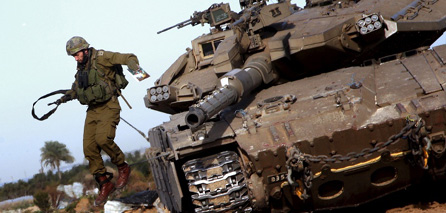Demanding a demilitarized state

In a striking exchange from May 2008, Tzipi Livni, the then-Israeli foreign minister, tells Palestinian negotiator Saeb Erekat that he will have to accept an Israeli military presence in the West Bank. His objection is met with one of Livni’s more memorable dismissals:
No right to choose
Erekat: Do I have a choice of who to place on my territory?
Livni: No.
Erekat: I have a conceptual framework – short of your jet fighters in my sky and your army on my territory, can I choose where I secure external defence?
Livni: No. In order to create your state you have to agree in advance with Israel – you choose not to have the right of choice afterwards. These are the basic pillars.
Israeli politicians have hardly been shy about demanding a demilitarised Palestinian state. “We cannot be expected to agree to a Palestinian state without ensuring that it is demilitarised,” Binyamin Netanyahu, the current prime minister, said in his foreign policy address at Bar-Ilan University in June 2009.
The Palestine Papers reveal how expansive that demand was: Israeli negotiators demanded to keep Israeli troops in the West Bank, to maintain control of Palestinian airspace, and to dictate exactly what weapons could and could not be purchased by the Palestinian security forces.
A long-term presence
A 2006 memo from the Palestinian Authority’s Negotiations Support Unit (NSU) outlines the military presence Israel wants to keep in the West Bank. It includes three early warning stations “on high ground”, and “a number of military installations” in the Jordan Valley, which forms the border between the West Bank and Jordan. Those military bases would be served by “dedicated access routes” – presumably Israeli military roads cutting through the Palestinian state.
“It also demanded the right to deploy on Palestinian territory in case of an emergency,” the memo said.
In a July 2, 2008 security meeting, Udi Dekel, a senior adviser to then-Israeli prime minister Ehud Olmert, said the Palestinians would have no choice but to accept a long-term Israeli presence in their state.
Dekel: We reject the idea of an international force instead of our presence… we insist on some Israeli “stuff” but maybe we can talk about hiding it or other ways.
Erekat: No. In that case we prefer occupation.
Dekel: Why are you going from one extreme to the other. Maybe we can hide it.
Erekat: When there is a Palestinian state, your occupation will be over. Your only presence will be civilian – doctors, technicians… no soldiers. We will not accept limited sovereignty.
Erekat pressed the issue, suggesting that Palestinians would “look for jobs” at a British military base in the Jordan Valley rather than “ways to attack” an Israeli base. Dekel rejected the idea, saying that the US or European forces “cannot be effective” in Palestine.
Dekel: Look at UNIFIL, it is proof that the internationals will change their entire mission and its implementation when it came to one terror attack. They just changed their way of doing business. They don’t have the determination. It is not the foreigner that will protect people in Tel Aviv.
Israeli negotiators say repeatedly that their interest in demilitarisation is driven by fear: In one May 2008 meeting, for example, Amos Gilad, the Israeli general, says that “we cannot accept a third army between us and Jordan which can develop into a threat”.
So, in addition to pushing for a long-term presence in Palestine, Israeli negotiators also sought to rule out specific roles for the Palestinian security forces. On May 11, 2008, Ahmed Qurei, the former Palestinian prime minister, asks if the Palestinian state will have control over its airspace. Livni tells him that it will have to share control with Israel, and that “sometimes we will need to act in your airspace”.
Qurei: I want sovereignty over my airspace to be respected.
Livni: Dignity means freedom to choose – you need to put limitations according to your free will.
Israel also insists on creating “white” and “black” lists for those security forces – documents detailing which equipment and roles are approved or prohibited.
Qurei: So you want a list of what is not allowed – and all the rest is allowed?
Livni: No. We need a written formula and a list. First a “no” list, then a “yes” list. So what you don’t need (no army) and what you do need (maintaining law and order).
The Palestinian Authority largely accepts the premise of demilitarisation, though it does not endorse an Israeli presence in the West Bank. (In a February 2007 meeting with Marc Otte, the European Union envoy, Erekat suggests that NATO forces fill the third party role.)
A May 20, 2008 memo from the NSU – talking points for an upcoming security meeting with the Israelis – states bluntly that “Palestine will not require an army, assuming we agree to a third party role to take care of our defence needs”.
All of these demands, of course, are intended to ensure Israel’s security. Palestinian negotiators rarely ask about how they will secure their own state against external threats – and when Erekat did, in May 2008, he received what was perhaps an unencouraging response:
Erekat: So no army, no navy… fine. But what do I do if my security is at stake? What should I do?
Gilad: Consult.







